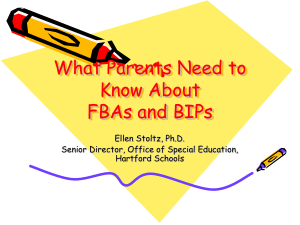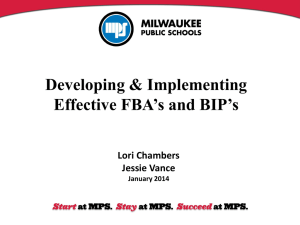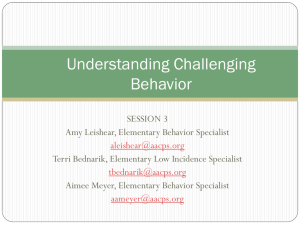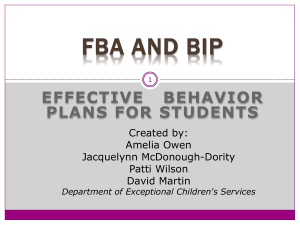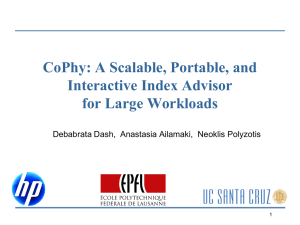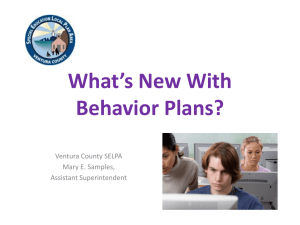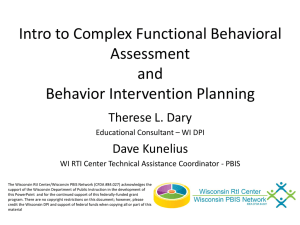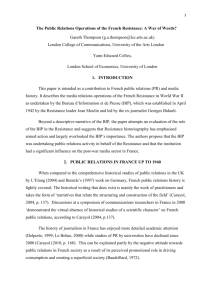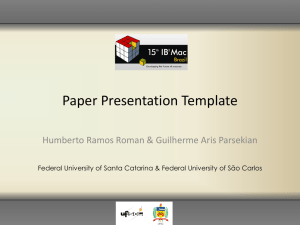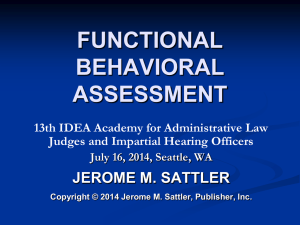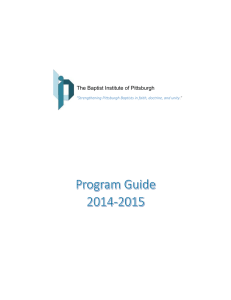BIPs - Center for Leadership in Disability
advertisement
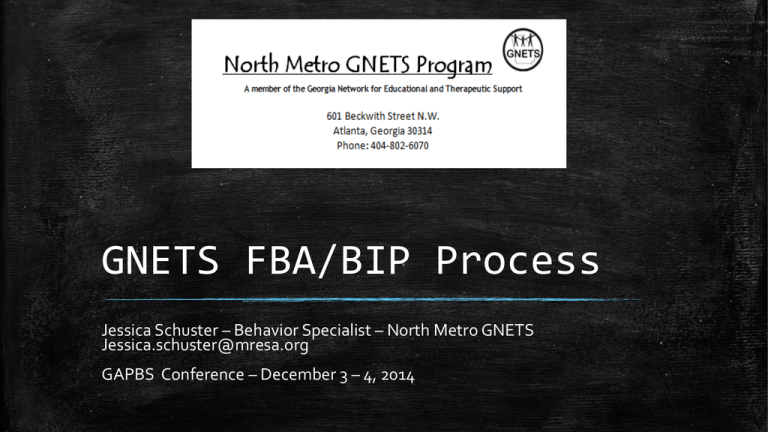
GNETS FBA/BIP Process Jessica Schuster – Behavior Specialist – North Metro GNETS Jessica.schuster@mresa.org GAPBS Conference – December 3 – 4, 2014 FBA/BIP Expectations ▪ All students will be expected to have a new FBA and new BIP written before their IEP date. – Take 10 days of ABC (Antecedent-Behavior-Consequence) data to get accurate and rich data to base your Behavior Intervention Plan from. ▪ BIPS will be written with Function Based Interventions ? – Functions of behavior: Attention, Escape, Automatic, Tangible – Power/Control is NOT a research based function. ▪ BIPS will be monitored closely – During bi-weekly team meetings – BIP Fidelity Checks (template later in presentation) ? FBA/BIP Timeline (Sample) Begin Taking ABC Data Write BIP IEP Meeting • September 15 • September 30 • October 15 Analyze data and write FBA IEP & BIP sent home for review • September 29 • October 1 Outline – FBA Data Collection Direct Data • ABC Data • Anecdotal Evidence Indirect Data • FAST ABC Data Collection Methods: – Behaviordoc.org ▪ Example – Riffel ▪ Example BehaviorDoc.org Customize Criteria for student Print Paper form – take 10 days of data Input data from paper form into BehaviorDoc spreadsheet Results: Outline – FBA Analysis ▪ FBA Templates: – Functional Behavior Assessment Template ▪ Example ▪ Cheat Sheet FAST (Indirect Data) Analyze ABC Data using FBA Template Analyze ABC Data using FBA Template Analyze ABC Data using FBA Template Template Example Cheat Sheet Template says: “Antecedent Events (Immediate triggers) Identify what happens immediately before the target behavior occurs:” Example says: “The direct observation data suggested that the behavior most frequently occurs in response to a teacher instruction or directive. Through a discussion with the classroom teacher, it was determined that the behavior may occur most frequently in response to teacher attention to other students or to another task.” Cheat Sheet says: “Antecedent events can be identified on the ABC Data Tool or Catalyst” Outline – Behavior Intervention Plan ▪ BIP Template – Example – Cheat Sheet Write BIP using FunctionBased Interventions Write BIP using Function-Based Interventions Write BIP using FunctionBased Interventions Template Example Cheat Sheet Template says: : “Replacement Behaviors (What new behavior will be taught or what current behavior will be increased that serves the same function as the behavior targeted for reduction and allow the student to achieve the same outcome) How will the replacement behavior be taught to the student?: Example says: “The student will be taught to wait for his teacher’s attention. Additional baseline data will be taken to determine how long the student can work independently without requesting his teacher’s attention. After a baseline is established (e.g., the student can work an average of 3 minutes without requesting his teacher’s attention), the student will be taught to gradually build upon that amount of time by doing the following: refer to a folder of appropriate “waiting” activities such as brief easy-tocomplete academic tasks, word-finds, drawing activities, etc. ▪ The student should be taught how to engage in these appropriate “waiting” tasks by the teacher and the paraprofessional. The student should be taught using direct instruction and role play. During the teaching process, he should be expected to demonstrate that he knows the difference between “waiting” and “not waiting” before the plan is implemented in context. ▪ The student should be taught how to self-monitor his “waiting” behavior. He should be placed in view of a clock and at the beginning of every day (during the check-in walk), he should be informed of how long he will be expected to wait prior to requesting his teacher’s attention. In addition, he should have a self-monitoring form on his desk that divides the day according to the segments of “waiting.” The form should be set-up in a way allows the student to mark if he has or has not waited the expected amount of time. Before the intervention is implemented, he should demonstrate competency in being able to use a clock. Cheat Sheet says: This should be a NEW or shaped behavior that has the same outcome for the student. For example, if the student escapes by eloping, he should be taught instead to ask for a break. ▪ The Replacement Behavior should make it easier to access the function (escape, attention, tangible, sensory) than the Target Behavior (the interfering behavior) ▪ See Function Based Interventions Matrix Additional Helpful Documents for Writing BIPS!! ▪ Function-Based Intervention Matrix – See next page ▪ Function-Based Intervention Protocols – (Presented by Dr. Cassandra Holifield following this presentation) Function-Based Intervention Matrix Trainings ▪ 1 Day training – AM: Functional Behavior Assessment training (4 components) ▪ ▪ ▪ ▪ Defining the Behavior (Operationally Defined) Ask about the behavior (Indirect Data) See the behavior (Direct Data – ABC) Hypothesis (Find the function) – PM: Behavior Intervention Plan training ▪ ▪ ▪ ▪ Components of a BIP Function Based Interventions Implementing the BIP Ongoing BIP Checks/Fidelity BIP Monitoring and Fidelity ▪ Effectiveness: – Clinical Team Meetings – School wide ▪ Classroom Use/Fidelity: – BIP Fidelity Report ▪ Written by Behavior Specialist or Compliance Specialist – Every teacher will be checked off at least once per semester ▪ Data Analysis and Function-Based Intervention Fidelity – FBA/BIP Evaluation and Rubric ▪ FBA/BIP Technical Adequacy Evaluation ▪ FBA/BIP Technical Adequacy Rubric BIP Fidelity Report BIP Fidelity Report BIP Fidelity Report Use of Fidelity Reports ▪ Copies given to the Lead Teachers and Site Coordinators after visit ▪ Copies given to the teacher after visit ▪ If “goals” recorded, a follow up visit by Behavior Specialist, Lead Teacher, or Site Coordinator is necessary to check on progress of goal ▪ Additional Notes or Comments at bottom – these are not goals, but they are things for the teacher to start thinking about for the next FBA or BIP they write BIP Availability in Classroom ▪ BIPs for every student that you teach should be kept in your classroom – Even if the student is not on your caseload (i.e. not in your homeroom), if you have that student in your classroom during an academic period – you must have a copy of their BIP ▪ Please put all BIPS into one binder, readily available for reference for walkthroughs. Special Thanks ▪ Thanks to Georgia State – Center for Leadership in Disability for partnering with GNETS to create better and more data driven Functional Behavior Assessments and Behavior Intervention Plans for our students. ▪ BehaviorDoctor.org – http://behaviordoctor.org/material-download/ – This is where the Data Tool can be found, along with several other useful materials for download.
